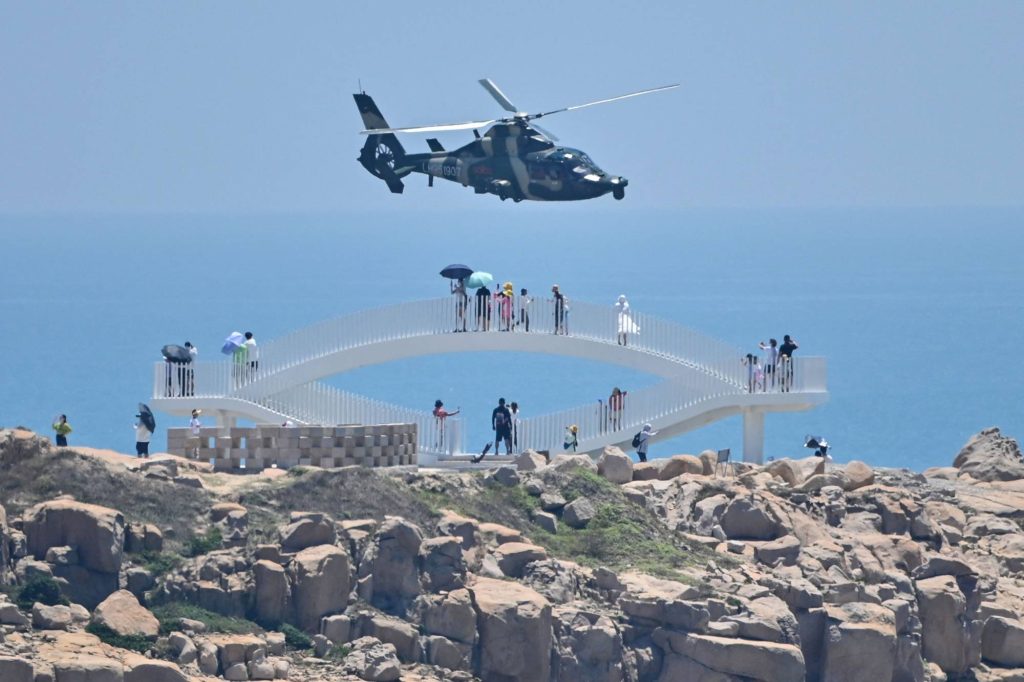China launched large-scale military exercises around Taiwan on Tuesday, mobilising its army, navy, air, and rocket forces in what Beijing described as drills simulating “precision strikes” and a blockade of Taiwan.
In response, Taiwan deployed its aircraft and naval vessels while activating land-based missile defence systems, denouncing China as the world’s “biggest troublemaker.”
The military manoeuvres come in the wake of U.S. Defence Secretary Pete Hegseth’s visit to Japan, where he reaffirmed Washington’s commitment to maintaining “credible deterrence” across the Taiwan Strait. China has consistently opposed U.S. support for Taiwan, which it claims as part of its territory, and has not ruled out the use of force to assert control over the island.
Taiwan’s defence ministry reported that 21 Chinese warships, including the Shandong aircraft carrier group, were operating near the island, alongside 71 aircraft and four coast guard vessels. This marks the largest naval deployment in the region since May last year, when 27 Chinese navy ships were recorded in Taiwanese waters.
Tensions between Beijing and Taipei have escalated since Taiwanese President Lai Ching-te took office in May 2024. Lai, who has been more vocal than his predecessor Tsai Ing-wen in asserting Taiwan’s sovereignty, recently referred to China as a “foreign hostile force” and proposed measures to counter growing espionage and infiltration activities.

Beijing justified its latest drills as a direct warning to Taiwanese “separatists,” with Chinese military spokesman Senior Colonel Shi Yi stating that the exercises involved “sea-air combat-readiness patrols, joint seizure of comprehensive superiority, assaults on maritime and ground targets, and blockades of key areas and sea lanes.”
The Eastern Theater Command, responsible for operations in the Taiwan Strait, released statements claiming its forces were “closing in” on Taiwan from multiple directions. Chinese state media amplified the rhetoric, sharing a graphic likening President Lai to an insect being roasted over an open fire. A widely circulated military video on social media featured animations of Sun Wukong, the mythical Monkey King, attacking a giant frog monster, symbolising China’s targeting of Taiwan.
China’s coast guard also announced it had carried out “law enforcement patrols” around the island, while Beijing’s Taiwan Affairs Office warned that advocating for independence would push Taiwan “into a dangerous situation of war.”
In response, Taiwan’s Presidential Office condemned Beijing’s “escalatory behaviour,” with Premier Cho Jung-tai stating that “resorting to displays of military force is not what modern, progressive societies should pursue.”
Beijing has repeatedly conducted large-scale military drills around Taiwan in recent years, often framed as rehearsals for a blockade or a full-scale military takeover. Analysts suggest that China may be more inclined to impose a blockade rather than risk an outright invasion, which would require a vast military operation and carry significant geopolitical risks.
Taipei-based defence expert Su Tzu-yun observed that the scale of the latest drills was similar to China’s “Joint Sword” exercises held in May and October. Meanwhile, Lin Ying-yu of Tamkang University noted that Beijing’s timing—immediately following Hegseth’s regional tour—suggests China is testing the Trump administration’s response ahead of an expected Trump-Xi summit.
Taiwan, a global leader in semiconductor chip production, remains a key flashpoint in the ongoing U.S.-China rivalry. Washington, while legally obligated to provide Taiwan with arms for self-defence, has long maintained a policy of “strategic ambiguity” over whether it would directly intervene in the event of a Chinese attack.
Concerns over U.S. President Donald Trump’s stance on Taiwan have added to the uncertainty. Last month, Trump warned that a Chinese invasion of Taiwan would be “catastrophic,” particularly in light of Taiwanese chipmaker TSMC’s announcement of a $100 billion investment in the United States.
The dispute between China and Taiwan dates back to 1949, when the defeated Kuomintang nationalist forces fled to Taiwan after losing the Chinese civil war to Mao Zedong’s communists. While Taiwan considers itself a sovereign nation, it has refrained from declaring formal independence—a move that Beijing has repeatedly warned would trigger military action.
Today, only 11 countries and the Vatican officially recognise Taiwan as a sovereign state.


